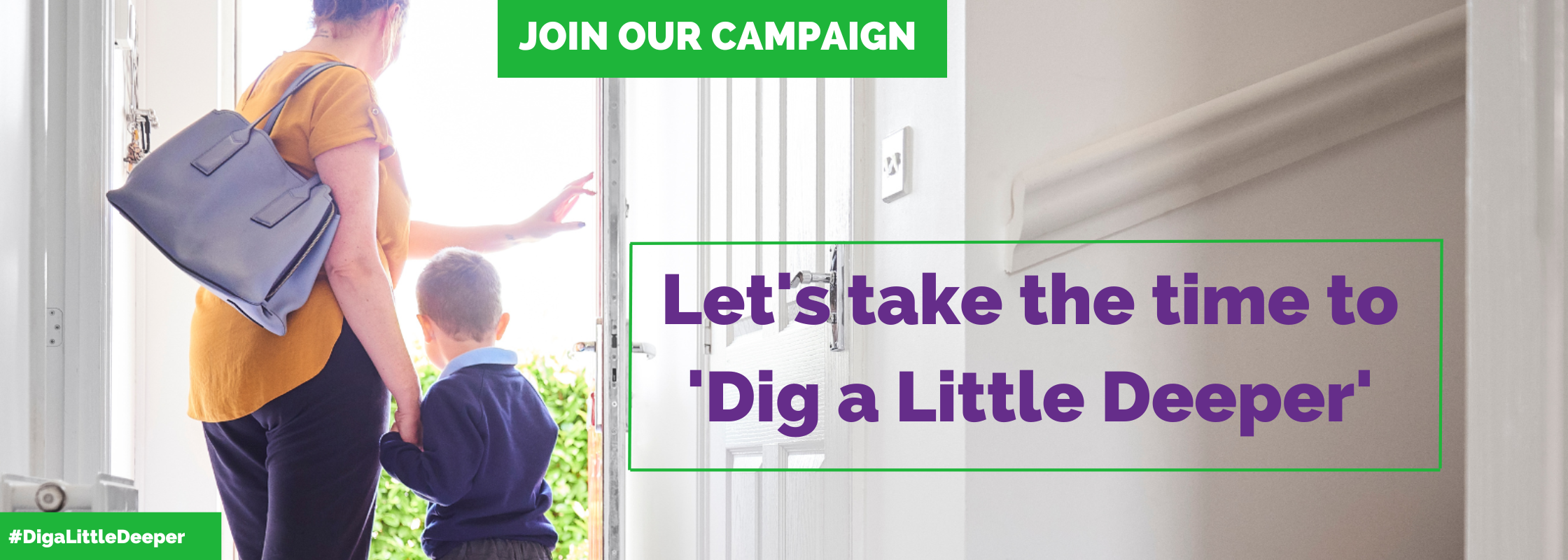
Children in England are missing weeks, months and years of their education
According to the most recent government data, 1.6 million children are persistently absent from school – missing on average five weeks over the year.
They are missing weeks, months, even years of their education, severely affecting their future life chances.
Schools are doing their best, but they can’t do it all. Having great teachers can’t help children if they aren’t in school.
Most parents want the best for their children, but getting them to school can be hard for families in crisis.
Demand for family support services around schools has never been greater, since the pandemic and now the cost of living crisis, but funding has been slow to keep up.
Based on the data we’ve collected over a six year period, one quarter of Early Help referrals from schools for family support were returned without action.
That’s why we are launching our ‘Dig a Little Deeper’ campaign. We are calling on the Government to help schools and families by funding more family support so they can tackle the root causes of persistent absence early on before they escalate.
Support our campaign if you want to help build a stronger bridge between home and school for all families so all children can be in school and ready to learn.
If we ‘Dig a Little Deeper’ and take the time to find out what’s going on at home we can solve absence problems in a lasting way.
- Persistent absence refers to when a child misses more than 10% of their schooling – which equates to around 20 days in a full academic year. This is the point at which educational attainment becomes affected for that child, severely affecting their future life chances.
- According to Government funded research for the Greater Manchester Combined Authority, the annual cost per individual missing at least 5 weeks of school (those below the Persistent Absence threshold) is £1965.
- For each percentage point of unauthorised absence, the likelihood of permanent exclusions increases at the same rate, according to the government’s Timpson Review published in May 2019.
- According to the 2017 Institute of Public Policy Research (IPPR) Making the Difference report, each excluded pupil costs the state around £370,000 in additional education benefits, healthcare and criminal justice costs across a lifetime equating to an additional £2.8 billion cost to the Treasury for the 2018/19 yearly cohort of (7,894) excluded pupils.
- A 2012 report from New Philanthropy Capital, Misspent youth: The costs of truancy and exclusion, estimated the total cost of regular school absence to the economy was £800m per year or £8.8bn for the 11 years a child is typically in school. This analysis found that the average unit cost of a young person who is regularly absent from school is £44,468 (over the working lifetime of the child).
- Analysis of the impact of persistent school absence on individual areas of public policy finds that the lifetime extra cost of crime committed by a truanting child is £6,776 and £33,694 in lost earnings. The report also suggests an aggregate saving of £3.8bn (adjusted for 2020 prices) would be made if all preventable persistent school absence was addressed, the equivalent of £354m per annum.
- A return-on-investment analysis for returning a persistently absent young person to school and improving attendance found that every £1 spent produced £11.60 in savings over the working lifetime of the child. Half of these savings accrue to the individual and half to the taxpayer. The report notes this represents a potential annual saving of £250m per annum.

Darrell's attendance
was just 87%
Darrell feeds himself with budget microwave meals and gathers any loose change he can find in the house for his bus fare. If he can’t find enough, he doesn’t go to school. He lives with his mum who struggles with addiction and has little contact with dad.
A home visit revealed he had 2 boxes in his room, one for clean clothes and one for dirty clothes, but he mainly used the floor. He had no desk or clear space to work.
Mum doesn’t mind if he attends school or not, she has too many other things to cope with. She was guarded and didn’t engage well with agencies who might support her.
At the start, Darrell’s attendance was 87%. Whole Family Support did the trick – he has sustained better attendance even without ongoing support. Darrell is now in year 11 and since he’s been back, he’s been late twice and absent for just 1 day.
Tackling the root causes of persistent absence
Disadvantaged families are most at risk of persistent absence. We need to ‘Dig a Little Deeper’ to understand why so many children are struggling with school.
The reasons for absence are different for each family. It takes time and trust to understand how best to help. There are no quick fixes.
Family Support practitioners don’t start talking about absence straight away, they listen.
Common barriers to school attendance can include poverty, undiagnosed SEND, eviction, domestic abuse, unsupported mental health issues and many more complex and often overlapping issues.
Until the underlying causes of poor attendance are tackled through support, improved attendance doesn’t last.

Our proposal to solve the school absence problem
We’re calling on the Government to do more to get practical support to families now.
We’re asking the Government to commit £90.2 million to pay for a service of family support practitioners to support the 19 Priority Education Investment Areas where persistent absence currently exceeds the national average of 12.1%.
This would provide 2,225 practitioners nationally, supporting 194,000 children and their families based on the School-Home Support whole family support model.
Our costed plan proposes that the policy is funded from existing government funding for families, including the Supporting Families Programme.
With this upfront investment, we can halve the cost of tackling persistent absence. It costs School-Home Support approximately £1000 to fund one tailored plan, per child per year. Compare £1000 to the £1965 annual cost per individual missing at least 5 weeks of school (those below the persistent absence threshold).

Join our campaign 'Dig a Little Deeper'
Help us to get our message to the policy makers that can make it happen.
I’m joining @SHSorguk to call on @educationgovuk to #DigaLittleDeeper into the causes of persistent absence and commit £90.2m to pay for family support practitioners in the 19 PEI Areas hardest hit by the school attendance issue. More on: digalittledeeper.org.uk
There are no quick fixes
By digging a little deeper and investing in family support early on we can tackle the underlying causes of absence, improving outcomes for the child as well as the wider family in the longer term.
We welcome the growth in breakfast clubs and other wrap-around activities to improve attendance, but they do little to change the home life the child returns to, so can only be part of the solution.
Whole Family Support strengthens the bridge between families and school, bringing education into the heart of the home, so all can benefit with improved outcomes, skills, resilience, and horizons.


Growing need for early family support
As part of our work, we’ve released new freedom of information (FOI) data which reveals that there was a 156% increase in the number of referrals for Early Help between 2018 and 2022. Staggeringly, a quarter of these Early Help referrals, designed specifically to ensure families and schools get support from their local authority, were returned to schools without action.
Councils are in a difficult position. Struggling to meet their statutory duties to provide social care services, many have been forced to cut preventative services like family support. As family support services like Early Help and Family Hubs aren’t statutory, funding hasn’t kept pace with growing need.
Disadvantaged families are most at risk of persistent absence, with recent data from the Department for Education showing that 35% of children eligible for free school meals were persistently absent in autumn 2021 and spring this year, compared with 18% of pupils who were not eligible.
- Findings from our freedom of information requests revealed that a quarter of Early Help Referrals made by schools were returned to the school for action.
- From 2018 to 2022, there was a 156% increase in the number of referrals and a 96% increase in the average number of referrals being returned for school action.
- Schools referring families to Local Authorities for Early help too often find that requests are returned without action. i.e. the severity of the case didn’t meet current thresholds. As Early Help isn’t a statutory service and funding hasn’t kept pace with growing need, schools have low expectations of support they can get for families they know need help. Families who need support aren’t getting it and schools are left trying to support families who need more bespoke help.
- As the circumstances driving increased need for support show no sign of abating. We expect the next couple of years will show similar increases in referrals as well as the number of referrals being returned due to the high demand unless new resources are allocated to family support.
- A Freedom of Information request by Action for Children reveals an estimated 64,000 children a year are missing out on early help services and then being re- referred to children’s social care within 12 months. 9 out of 10 Local authorities cut early intervention spending between April 2015 and April 2020. For every two children that receive preventative targeted early help support, there are three children receiving more costly social care interventions. The report shows big variations of early help provision around the country.
Our practitioners helped over 18,000 family members, but many more still need support with school.
We currently work with schools and families across the country, and we are one of the few organisations working with the whole family to tackle attendance, engagement and wellbeing issues.
But many more families need help.
We want more organisations to deliver whole family support, so they can help schools to ‘Dig a Little Deeper’ and more families can get the help they need.
The Government knows our model works, so it must speed up the rollout of whole family support to more communities where attendance is poor, and need is greatest.
As seen in our most recent Impact Report, demand for support with school attendance has never been greater, particularly in communities hardest hit by the pandemic and now the cost-of-living crisis. The average caseload of our practitioners has intensified — with more than double the number of home visits, phone calls and meetings — compared to the previous year.
Illustrating the impact of rising living costs, the number of families with school attendance and engagement challenges, who also presented with concerns relating to work and money, increased by 82%.

Why our model works
The upfront investment in family support practitioners will generate significant long-term savings which can then be used elsewhere in education. Using our model and approach, the Government could halve the cost of tackling persistent absence.
It costs School-Home Support approximately £1000 to support one tailored plan per child per year, compared to the £1965 cost for that same child missing at least 5 weeks of school.
According to our latest impact data, scaling family support around schools could offer impressive benefits across the Priority Education Investment Areas, helping 7 in 10 persistently absent children and young people to spend an average of 6 more weeks in school, with improved attendance.
The difference we make – Jayden’s story
 Jayden is 7 years old and lives with his mum and two younger siblings. His mum is a survivor of domestic violence and has no family support network. The family were facing significant financial worries and mum was incredibly worried about the increasing cost of living. Pressures at home were affecting Jayden’s learning and he was falling behind at school. After the family was referred to School-Home Support, our practitioner Ayesha supported Jayden’s mum with alleviating some of her financial worries, setting up a payment plan to manage her existing debts and supporting her to prepare for the increasing energy prices.
Jayden is 7 years old and lives with his mum and two younger siblings. His mum is a survivor of domestic violence and has no family support network. The family were facing significant financial worries and mum was incredibly worried about the increasing cost of living. Pressures at home were affecting Jayden’s learning and he was falling behind at school. After the family was referred to School-Home Support, our practitioner Ayesha supported Jayden’s mum with alleviating some of her financial worries, setting up a payment plan to manage her existing debts and supporting her to prepare for the increasing energy prices.
As Jayden’s younger brother had recently been diagnosed with autism, Ayesha guided mum on applying for the Disability Living Allowance she is entitled to. Ayesha applied to our Welfare Fund to buy a new school uniform for Jayden, and a desk so that he would have some space at home to complete his homework away from his younger siblings. Since getting his new desk, Jayden is submitting his homework frequently and has even won an award from his headteacher. As Jayden is engaging more with school, he is enjoying his learning and looks forward to going to school.
Contact us
If you have any questions about our ‘Dig a Little Deeper’ campaign or want to know more about School-Home Support, get in touch via the information below:
0845 337 0850
enquiries@shs.org.uk
School-Home Support
3rd Floor, Solar House
1-9 Romford Road
London
E15 4LJ
If you’re contacting from the press and want to ask us about a story you’re covering please contact: press@shs.org.uk
